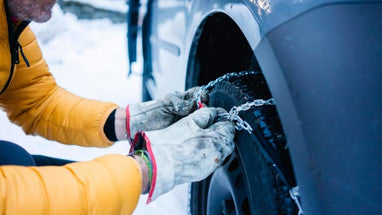What to pack in your car to stay safe during severe winter weather

(CNN) — If you're ever stranded in your car due to a bad winter storm -- like many Virginians were this week -- being prepared can be the difference between survival and serious harm or death.
For nearly two days early this week, motorists were stuck on Interstate 95 in snowy and icy conditions in eastern Virginia after a storm left more than a foot of snow in the area.
Winter storms, bad weather and sloppy road conditions can be frightening and dangerous for travelers, and "are a factor in nearly half a million crashes and more than 2,000 road deaths every winter," according to AAA.
Because of these risks, "it's always important to be prepared versus get caught in a situation that turns dangerous or potentially deadly, especially in the winter season when temperatures can drop very, very cold in a short amount of time," said CNN meteorologist Jennifer Gray.
"Just as we prepare for hurricane season -- even if a hurricane doesn't come to our location, it's still better to be prepared," she added.
Gray speaks from experience. "I learned it the hard way -- that Atlanta snow jam in 2014. I was stuck on the road for 15 hours, and I didn't have anything in my car," she said. "It was incredibly scary."
You should, of course, minimize non-essential travel during severe winter weather, the Georgia Emergency Management and Homeland Security Agency recommends.
Regardless of where you live, "no part of the US can handle a road turning into an ice rink," Gray said. "It doesn't matter how good you are as far as a driver in winter weather." But if you simply must travel, here's how to prepare in case you encounter severe weather this winter.
Winterizing your car
Regardless of whether a severe storm is coming, prepping your car to handle winter weather is something you should do every fall, according to the US Centers for Disease Control and Prevention.
Have your vehicle serviced as often as its manufacturer recommends, and do the following, the CDC advises:
• Replace windshield wiper fluid with a winter-suitable mixture (which will contain additives to prevent freezing).
• Ensure the tires have sufficient tread and air pressure, which you can measure with a tire gauge. Replace worn tires and fill low tires with air to the pressure recommended for your car.
• Keep the gas tank near full to help avoid ice in the tank and fuel lines.
• Keep your car in proper working condition by checking the heater, defroster, brakes, brake fluid, ignition, emergency flashers, exhaust, oil and battery.


